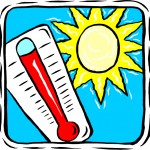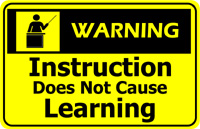People on Twitter often notice that I’ve got some creds in the “eddication” area, and ask me questions about how to fix the schools down here in South Carolina. We’re currently about 56th out of the 50 states in terms of quality of education, so there’s a lot of talk going on. And they’re usually looking for some kind of quick-fix — bigger budgets, smaller class sizes, charter schools, magic beans — rather than any kind of basic systemic change.
The one thing most everyone down here can agree on is that “testing” is unfair. Students here fail miserably at the No Child Left Behind testing, and the program is reviled. So one of the ways I try to talk with people about education is to ask them about their HVAC system.
“Do you have air conditioning and heating in your house? Good! Now, does your thermostat wait until the end of the day to measure whether it’s too hot or cold, and then decide which one to turn on? It doesn’t, does it? It’s constantly assessing the temperature all the time, based on the limits that you set. And as soon as the temperature gets outside those limits, something happens…”
 That’s how learning happens in the best systems. We create “goals” (temperature limits) and constantly keep making “assessments” (measurements) of how we’re doing in reaching those goals. So there’s no real surprise at 10PM each night — we know already whether it’s been hot or cold, and we’ve taken action to change what we’re doing based on that.
That’s how learning happens in the best systems. We create “goals” (temperature limits) and constantly keep making “assessments” (measurements) of how we’re doing in reaching those goals. So there’s no real surprise at 10PM each night — we know already whether it’s been hot or cold, and we’ve taken action to change what we’re doing based on that.
A Charter School is probably going to be more successful than our traditional public schools for just that reason. They begin with a clear set of goals — or educational objectives — and will be scrutinized closely by folks who’d like to see them succeed. And, more importantly, by folks who’d like to see them fail. So they’ll be doing lots of assessment along the way, rather than waiting for that “test” at the end of the year.
I suspect that you’ll see many of them succeed for just that reason.

{ 2 comments… read them below or add one }
Whoah! I’ve often been a fan of monitoring criticism and gleaning information from your enemies, but you put this *so well*. I really hope people will catch on to what you’ve brought up about charter schools. What seems like the “roadblock” to keep them from succeeding, those who oppose the schools will actually *improve* them.
And, what’s learned in charter schools can be applied to “regular” schools, too. Well, that is, once “regular” schools actually admit they need help.
As a former public school teacher, I agree with your analogy of a thermostat. Here is the challenge that I faced when in the classroom, as teachers we could be either thermostats or thermometers and the public education system typically rewarded the successful thermometers.
Thermometers notice when something is wrong but they don’t know how to take the steps to fix it. They can only fix something with hindsight and are great for letting you know when something is broken—just like the annual tests let you know when someone has failed. In the Texas public education system, teachers have a clear set of standards/goals that their students are to learn on a weekly, monthly and yearly basis. The challenge is that the teachers teach to the test/standards in traditional ways best suited for industrial-revolution-style learning. They have difficulty adapting their teaching styles to the best learning styles of their students and the changing world environment.
Thermostats take the temperature first and then put a plan into place using the standards/goals given to them. They do their best to regulate the temperature to stay in synch with the current conditions. These teachers not only evaluate what their students know and construct a plan on where they need to go, they also adapt that plan to accommodate each individual student’s learning styles and consider all the factors impacting that learning. Similarly, thermostats don’t like to spend time with their peer thermometers and usually buck the top-down, all teachers will teach these concepts this way, status-quo approach to department head mandates and school edicts. Unfortunately, since they are normally ignored for their ability to lead their students to learning, these thermostats burn out and decide to teach their teaching skills to other fields.